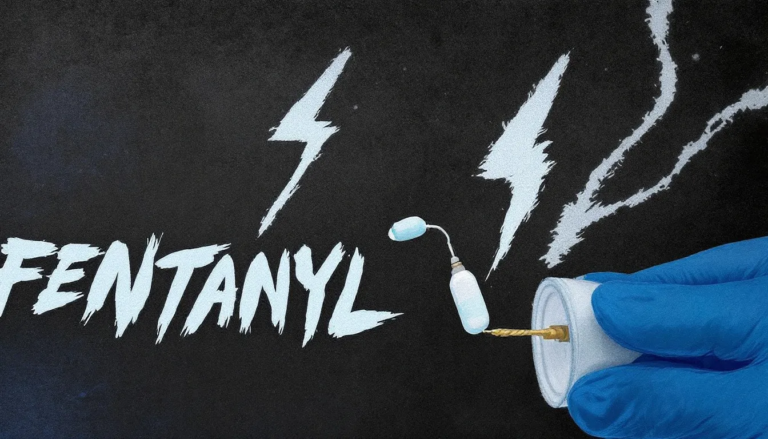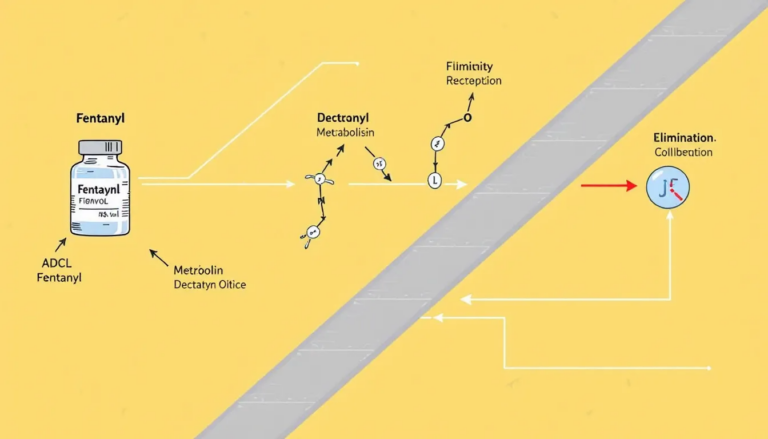
How long does fentanyl stay in your system? Typically, urine tests detect it for 24-72 hours, blood tests up to 12 hours, and hair tests up to 90 days. Various factors like metabolism and health affect these timelines. This article covers all you need to know about fentanyl detection.
Key Takeaways
-
Fentanyl is a highly potent synthetic opioid used in medicine for severe pain management, but it carries a significant risk of addiction and overdose.
-
Detection times for fentanyl in the body vary based on factors like dosage and metabolism, with urine tests identifying it for 24 to 72 hours, and hair tests for up to 90 days.
-
Preventing fentanyl abuse involves education, community outreach, and access to naloxone, which can counteract overdose effects effectively.
Table of Contents
Understanding Fentanyl
Fentanyl is a synthetic opioid, renowned for its ability to treat severe pain and its potency, being 50 to 100 times stronger than morphine and up to 50 times more potent than heroin. This incredible strength makes fentanyl a double-edged sword: invaluable in medical settings yet perilous when misused. Fentanyl abuse has become a significant concern due to its high potential for addiction and the severe consequences associated with its misuse.
Fentanyl achieves its effects by activating opioid receptors in the brain, leading to feelings of euphoria, relaxation, and potent pain relief. However, these same properties contribute to its high addiction risk. The misuse of fentanyl, whether through medical misuse or illicit use, poses severe health risks, including overdose and death, making it a focal point in discussions about opioid addiction.
Medical Uses of Fentanyl
In the realm of medicine, fentanyl is a critical tool for treating severe pain, particularly in patients with serious conditions such as cancer. It can be administered in various forms, including patches, lozenges, and injectables, each tailored to specific medical needs. The choice of administration method affects the drug’s half-life, with transdermal patches providing prolonged pain relief compared to intravenous injections.
Despite its benefits in pain management, careful monitoring helps prevent potential misuse and addiction.
Illicit Fentanyl and Abuse
Illicit fentanyl, often found in powder form, tablets, or spiked on blotter paper, poses a grave threat due to its extreme potency. It is commonly consumed by snorting, smoking, or injecting. The danger is amplified by counterfeit pills that frequently contain lethal doses of fentanyl. A single kilogram of fentanyl distributed by drug trafficking organizations can be potent enough to kill 500,000 people, highlighting the scale of the threat.
Repeated use of fentanyl leads to tolerance, necessitating higher doses to achieve the same effects, which increases the risk of overdose.
Community outreach programs and collaboration with law enforcement play a key role in curbing fentanyl misuse. Understanding the risks and implementing preventive measures can help communities mitigate the devastating impact of fentanyl abuse.
How Long Does Fentanyl Stay in Your System?

The duration that fentanyl remains detectable in the body varies widely, influenced by several factors and the type of drug test used. Fentanyl can be detected in urine for 24 to 72 hours, and up to 96 hours for its metabolites. However, its presence in the body can range from hours to several months, depending on individual metabolism and health. These timelines are vital for managing medical use, monitoring risks, and preventing abuse.
The metabolic processes play a key role in determining how long fentanyl stays in the system. While the effects of fentanyl wear off relatively quickly, its metabolites linger longer, making detection possible even after the drug’s primary effects have faded. This knowledge helps in effectively detecting fentanyl use and mitigating potential abuse.
Factors Influencing Detection Time
Several factors influence how long fentanyl stays in your system, including dosage, frequency of use, and individual metabolic rate. Higher dosages and frequent use lead to longer detection times. This is a result of drug accumulation in the system. Variability in metabolism among individuals also plays a significant role in processing and eliminating fentanyl.
Hydration levels and overall health further affect detection times. For instance, urine tests can detect fentanyl within 1 to 2 hours of use and for up to 3 days after. Blood tests, on the other hand, may identify fentanyl for a maximum of 12 hours post-consumption. These factors are crucial for accurate drug testing and effective monitoring.
Comparison with Other Opioids
Fentanyl’s detection times generally exceed those of other opioids like heroin and oxycodone. For example, while heroin and oxycodone might clear from the system within days, fentanyl can take up to several weeks. Saliva tests, although less reliable, can detect fentanyl for 1 to 3 days after use.
This extended detection window underscores the importance of understanding fentanyl’s unique properties compared to other opioids.
Metabolism and Elimination of Fentanyl

Fentanyl metabolism primarily occurs in the liver, where it is processed by the CYP3A4 enzyme system. This process transforms fentanyl into inactive metabolites, which are then filtered out by the kidneys and excreted through urine. The efficiency of these metabolic processes is influenced by factors such as age, weight, and overall health.
Healthy individuals with well-functioning organs metabolize fentanyl more efficiently, reducing the drug’s half-life and detection times.
The Role of the Liver and Kidneys
The liver plays a central role in breaking down fentanyl into its inactive metabolites. These metabolites are then filtered out by the kidneys, which excrete them through urine. Factors such as metabolic rate, age, and overall health significantly influence how quickly fentanyl is processed and eliminated from the body.
Understanding the roles of these organs is crucial for managing fentanyl use and detecting potential abuse.
Half-Life of Fentanyl
The half-life of fentanyl, which ranges from 3 to 7 hours, is a key factor in determining how long the drug stays in the system. The method of administration also affects the half-life, with intravenous administration resulting in a shorter half-life compared to transdermal patches.
The half-life concept helps in understanding the pharmacokinetics of fentanyl and planning appropriate medical interventions.
Drug Testing for Fentanyl
Drug testing for fentanyl involves various methods, each with different detection windows and accuracy levels. Standard drug tests often fail to detect fentanyl directly, as they screen for metabolites instead of the drug itself.
Knowing the nuances of these tests is vital for accurately detecting fentanyl use and preventing abuse.
Urine Tests
Urine tests are one of the most commonly used methods for detecting fentanyl, capable of identifying the drug within 1 to 2 hours of use and for up to 3 days afterward. Approximately 75% of fentanyl and its metabolites are excreted in urine. These tests play a crucial role in monitoring fentanyl use and preventing abuse.
Blood Tests
Blood tests, although less commonly used, can detect fentanyl for up to 12 hours or more after use. The detection window for blood tests ranges from 5 to 48 hours, making them significant for timely drug testing and medical assessments. Their shorter detection window is a crucial factor in acute medical situations.
Hair Tests
Hair tests provide a long-term view of fentanyl use, capable of detecting the drug for up to 90 days or more. The detection window may vary depending on hair length and other variables.
Hair follicle tests are particularly useful for monitoring long-term fentanyl use and ensuring compliance with treatment programs.
Saliva Tests
Saliva tests are less consistent in their ability to detect fentanyl compared to other methods. Typically, they can identify fentanyl for 1 to 3 days after use.
Despite their limitations, saliva tests are one of the drug testing methods used to detect fentanyl.
Risks and Side Effects of Fentanyl Use

Fentanyl is classified as a Schedule II controlled substance due to its high potency and potential for abuse. The primary risks associated with fentanyl use include addiction and the high potential for overdose, which can be life-threatening. Even small doses of fentanyl can cause respiratory depression, overdose, and death. Common side effects of fentanyl use include euphoria, slowed breathing, and confusion.
These risks must be understood to prevent abuse and ensure safe medical use.
Short-Term Effects
Fentanyl produces immediate effects such as happiness, relaxation, and sedation. Positive short-term effects include feelings of euphoria and relaxation. Negative short-term effects can include drowsiness and confusion. Additionally, they can lead to slowed breathing and even coma.
Recognizing these effects aids in managing fentanyl use and preventing accidental overdoses.
Long-Term Effects
Prolonged use of fentanyl can lead to severe health issues such as physical dependence, impaired cognitive function, and risks of coma. Long-term use also disrupts sleep patterns and decreases appetite. As tolerance develops, users may risk overdose due to increasing dosage requirements to achieve the same effects.
Being aware of these long-term effects is essential for effective addiction treatment and prevention.
Overdose and Emergency Response
Fentanyl’s high potency significantly increases the likelihood of overdose, particularly in users unaware of its presence in other drugs. Over 150 people die daily from synthetic opioid-related overdoses, making it a serious public health issue.
Fentanyl overdoses require immediate medical attention due to the potentially life-threatening effects. Rapid response and proper management can save lives in these critical situations.
Signs of Overdose
Recognizing the signs of a fentanyl overdose is vital for timely intervention. Symptoms consist of pinpoint pupils and slowed breathing. Other signs include unresponsiveness and loss of consciousness. Recognizing these signs can be the difference between life and death, as prompt action is needed to prevent fatal outcomes.
Naloxone Administration
Naloxone is a lifesaving medication that can rapidly reverse the effects of a fentanyl overdose when administered promptly. Available in both injectable and nasal spray forms, naloxone must be administered by someone else during an overdose.
Community-based strategies, such as naloxone distribution programs, greatly reduce the risk of fatal overdoses and enhance public safety.
Withdrawal Symptoms and Treatment
Fentanyl addiction is characterized by compulsive drug use despite negative consequences. Withdrawal from fentanyl can be particularly challenging, with symptoms such as insomnia, anxiety, and other significant physical and psychological challenges. Professional help is crucial in managing these symptoms and ensuring a safe detox process, including fentanyl addiction treatment.
Medical supervision can provide a safe environment during detox, which is essential for recovery.
Common Withdrawal Symptoms
Common withdrawal symptoms from fentanyl include trouble sleeping, anxiety, and urinary retention. These symptoms reflect the body’s response to the absence of fentanyl after prolonged use and can be severe enough to require medical intervention.
Medication-Assisted Treatment (MAT)
Medication-Assisted Treatment (MAT) is a cornerstone of opioid addiction treatment, addressing cravings, withdrawal symptoms, and overdose risk. MAT combines medications with counseling and support groups to provide a comprehensive approach to addiction treatment.
The specific medications used are tailored to the needs of the individual, ensuring effective management of withdrawal and recovery.
Behavioral Therapies for Fentanyl Addiction
Behavioral therapies are essential in modifying attitudes and behaviors associated with fentanyl use, supporting individuals in recovery. These therapies address the psychological aspects of addiction, helping individuals develop healthier thought patterns and coping strategies.
Cognitive-Behavioral Therapy (CBT)
Cognitive-Behavioral Therapy (CBT) focuses on identifying and altering negative thought patterns, helping individuals develop coping strategies to avoid relapse. By reshaping these thought patterns, CBT significantly reduces the likelihood of substance use relapse and enhances management of triggers and stress.
Contingency Management
Contingency Management utilizes a reward-based system to reinforce positive behaviors, such as maintaining sobriety from fentanyl. This approach provides incentives for achieving drug-free tests, increasing treatment adherence and promoting recovery.
Preventing Fentanyl Abuse

Preventing fentanyl abuse requires a multi-faceted approach, including education, awareness, and support systems. Community naloxone distribution programs have successfully reversed thousands of overdoses, underscoring the importance of public access to this life-saving medication.
Educating people about naloxone access laws is essential for improving its distribution in pharmacies and community settings.
Education and Awareness
Educational campaigns targeting young people are crucial for informing them about the risks associated with fentanyl use and the importance of carrying naloxone. Raising awareness about fentanyl’s dangers and proper naloxone use can save lives in cases of overdose.
Healthcare professionals and community leaders must collaborate to disseminate this information effectively.
Support Groups and Counseling
Participation in support groups provides essential emotional and psychological support for individuals recovering from fentanyl addiction. These groups foster a sense of belonging and accountability, which is crucial for long-term recovery. Engaging in group therapy offers a supportive environment that promotes recovery and helps prevent relapse.
Summary
Understanding the complexities of fentanyl use, from its medical applications to the risks of abuse, is vital for managing opioid addiction. This guide has explored the detection timelines, metabolism, and elimination of fentanyl, as well as the critical steps for responding to overdoses and managing withdrawal symptoms. Medication-Assisted Treatment and behavioral therapies play pivotal roles in supporting recovery and preventing relapse.
By educating ourselves and our communities, we can mitigate the devastating impact of fentanyl abuse and support those affected. Together, we can foster a safer, healthier future, free from the grips of opioid addiction.
Frequently Asked Questions
How long does fentanyl stay in your system compared to other opioids?
Fentanyl typically stays in your system for a shorter duration compared to other opioids such as heroin or oxycodone, leading to a narrower detection window. This can impact how it is monitored in drug testing.
What is the cornerstone of addressing fentanyl addiction?
Medication-assisted treatment (MAT) is crucial for effectively addressing fentanyl addiction. It combines medications with counseling and behavioral therapies to support recovery.
What role do behavioral therapies play in fentanyl addiction treatment?
Behavioral therapies play a crucial role in fentanyl addiction treatment by helping individuals recognize and alter negative thought patterns and behaviors linked to their addiction. Techniques like cognitive-behavioral therapy (CBT) and contingency management are particularly effective in promoting lasting recovery.
What is a key strategy for preventing and responding to fentanyl overdoses?
A key strategy for preventing and responding to fentanyl overdoses is educating individuals about the signs and symptoms of an overdose, along with instructing them on the proper use of naloxone. This knowledge can save lives in critical situations.
What is the relationship between fentanyl and the opioid crisis?
Fentanyl is a key contributor to the increase in opioid-related overdose deaths, significantly exacerbating the opioid crisis. Its potency and prevalence in illicit drugs have made it a critical focus in addressing this public health emergency.

MD Mitchell Grant Cohen
Dr. Mitchell G. Cohen is a board-certified Internal Medicine specialist with over 34 years of experience in patient-centered healthcare. A graduate of Hahnemann University School of Medicine, Dr. Cohen completed his internship at the University Health Center of Pittsburgh, where he gained invaluable hands-on experience. He is also a certified addiction specialist, holding membership with the American Society of Addiction Medicine (ASAM).
Currently based in Nashua, NH, Dr. Cohen is affiliated with Saint Joseph Hospital, where he provides comprehensive care focusing on both internal medicine and addiction treatment. His expertise includes prevention, diagnosis, and management of adult diseases, as well as specialized care for individuals facing substance use disorders.
Dr. Cohen is committed to fostering open communication, ensuring his patients are fully informed and empowered to make confident decisions about their health and treatment options.


